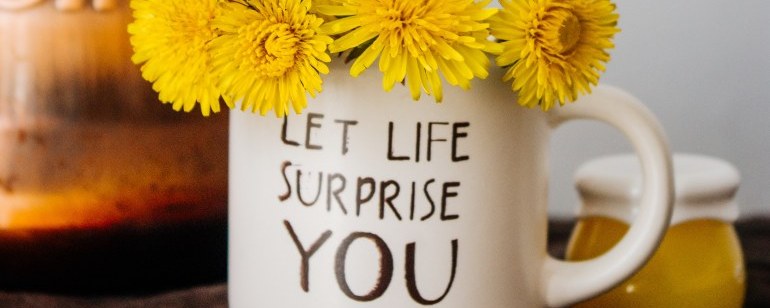How to bring more happiness into your life: positive interpretations of life
Money can’t buy happiness, this much we know. But, there are ways we can cultivate happiness through simple practices that work.
Happiness is made up of several elements, as explained in Stress-Free Living, a book by Dr Amit Sood, published by the Mayo Clinic. The work is based on several research studies looking at ways to improve stress, anxiety, resilience, happiness, wellbeing and quality of life, and the basis for this two-part blog series on how you can bring more happiness into your life. Read part one here: joyful attention & kind attention.
The third component of happiness as discussed in Stress-Free Living is ‘positive interpretations of life’, which entails shifting the way you make sense of life to be more positive, the topic I will cover in this blog.
When I first started to take my personal development seriously, I began to look at the quality of thoughts I was having.
I noticed that most of my thoughts had a negative quality. For example, if I was thinking about something that I was seeking to achieve, I tended to think about the aspects I hadn’t yet mastered rather than how far I’d come. If I was thinking about something for the future, I tended to focus on the things that could go wrong rather than the things that could go right.
I would never have told you that I was a pessimistic or negative person. I actually would have told you that I was a positive person, but the quality of my thoughts, the nature of my thoughts, gave the lie to that.
If this resonates with you, be assured that there are straightforward ways in which you can develop a more positive interpretation of life. I know, because these are things I’ve actually had to do myself and I really do understand the difficulties or challenges that they can present. But I also understand just how much they’ve actually changed my daily experience.
POSITIVE INTERPRETATIONS OF LIFE
Gratitude with a difference
Not the sort of gratitude that you repeatedly get told to write down, such as three things you’re grateful for at the end of the day or at the beginning of the day.
I don’t need another task for my to-do list, and I don’t need something that I have to fake some of the time.
The way that we’re looking at gratitude here is by waiting for and cultivating that rushing flow of gratitude. So when something just surprises you, it takes you over. That rush of emotion rises up in you where you are spontaneously grateful.
Now, really notice it, really experience it. And then cultivate it – allow yourself to deeply, fully express and experience that gratitude in that moment. It’s like any other kind of muscle – the more you give attention to your gratitude when you’re experiencing it, the more able you will be to experience it.
Compassion and acceptance
My approach to compassion these days is very much influenced by mindfulness practice. One of the things I love that Shamash Alidina talks about is how mindfulness could really be renamed ‘kindfulness’.
You could look at everything, including yourself and your own thoughts, with kindness. Compassion for me begins with yourself. It begins with being able to treat your own experience, feelings, thoughts, and dreams with kindness. If we can show compassion towards ourselves, it is so much easier to show it to other people without any doubt at all.
In my mind, when we find that we’re judging other people, it’s because we’ve judged ourselves first. The benchmark that we set is so high that no one can get over it. Compassion is also based on the idea that we’re not separate, that we’re part of one unifying consciousness, that we are human beings first, and then all the other labels later.
Tip: think about the things that you have in common with somebody when you need to access your compassion. What is it that you have in common with this person? What is it that you both want or need? And from there, it is often easier to be compassionate, even when they’re not behaving in a way that you appreciate.
Next is acceptance. Once again, for me, heavily influenced by mindfulness. Acceptance is really the baseline from which any change can occur.
While you’re in resistance, while you’re still wanting things to be other than they are it is really very difficult to change. Whereas if you can deeply, radically accept yourself and the situation as they are, you actually have a foundation from which you can decide whether anything needs to change.
And if it does, you have a much greater chance of actually making that change.
The way to be more accepting of other people is to be more accepting of yourself. So practise on yourself first. Practise accepting how you feel. Practise accepting the moments when you don’t get things right. Practise accepting who you are, what you love, who you love, what you want from your life.
Out of that, you will get rich rewards. And most importantly, for this series, more happiness.
You choose the meaning
Meaning is something that we can cultivate. We can in fact, create meaning for ourselves out of our life events.
In terms of developing a positive interpretation of life, meaning is very important. You assign the meaning to whatever happens. Sometimes we accept other people’s meanings, and sometimes we accept them without challenging them. And I’m asking you to change. Change that now, if you can, and begin to develop your own meanings for events or things that people might say.
One of the ways that I like to develop my own meanings comes from Nancy Kline’s Time to Think. She asks these brilliant questions: number one, is it true? Can I know for definite that it’s true? In most cases, it probably isn’t knowable, undeniably true. So if another interpretation could be possible, ask: what could I credibly believe instead?
It is such a good question, and the word credible is really important. You have to be able to believe it. Or even just entertain it, you might not fully believe it yet, but you can entertain this other possible meaning.
It’s a game-changer. It’s not a phrase I use very often because I think it’s overused. But really, that question is a game-changer. So let’s take control of our lives. Let’s take control of our thinking and begin to choose the meaning that we assign to things and make those meanings helpful.
Make those meanings things that empower you, things that enable you, things that help you grow, rather than things that limit you or in any way denigrate you. You deserve a positive meaning in your life, and you get to choose it.
Float towards forgiveness
I want to be so clear, forgiveness is not required for you to recover from trauma.
However, in terms of lightening your load, forgiveness is something I would highly recommend you allow time for. And there’s a beautiful phrasing from an artist colleague, Jo Jayson, which I love, which is ‘allow yourself to float towards forgiveness’. Let it happen naturally, rather than going and searching for it and damning yourself if you can’t yet achieve it. Rather, float towards it over time.
For me, often it’s a case of I just wake up one morning and realise I have already forgiven.
Celebrate regularly
We need to make sure that we build regular, joyful celebrations into our lives.
This is so important, especially as life gets busy and is full of normal ups and downs. Celebration is even more important when life is full of tragedy. Build-in and seek out opportunities to celebrate and make those celebrations special.
Joy inspires, alleviates and softens life. Make more room for it!
Reflection and prayer
For me, prayer is about asking for the support that I need. Reflection, which is something I largely do in meditation, is about learning to know myself better and being able to hear the dictates of my soul – both are needed.
We do get to ask for what we need and then in reflection, we receive our answers. One feeds into the other.
In this two-part series, we’ve covered ‘joyful attention’, ‘kind attention’ and ‘positive interpretations of life’, the components of happiness as shown through research in the Mayo Clinic book Stress-Free Living. I’ve shared practical methods by which we can improve our ability to develop these three elements in order to increase our happiness. I hope that you find pleasure in building these methods into your life and notice how they affect your levels of joy.
Would you like to be supported in bringing more happiness into your life? I am an experienced Life Coach, dedicated to walking alongside you, providing the guidance you need at just the right place. Learn to love the life you have and build the life you want. Book a coaching session here.



